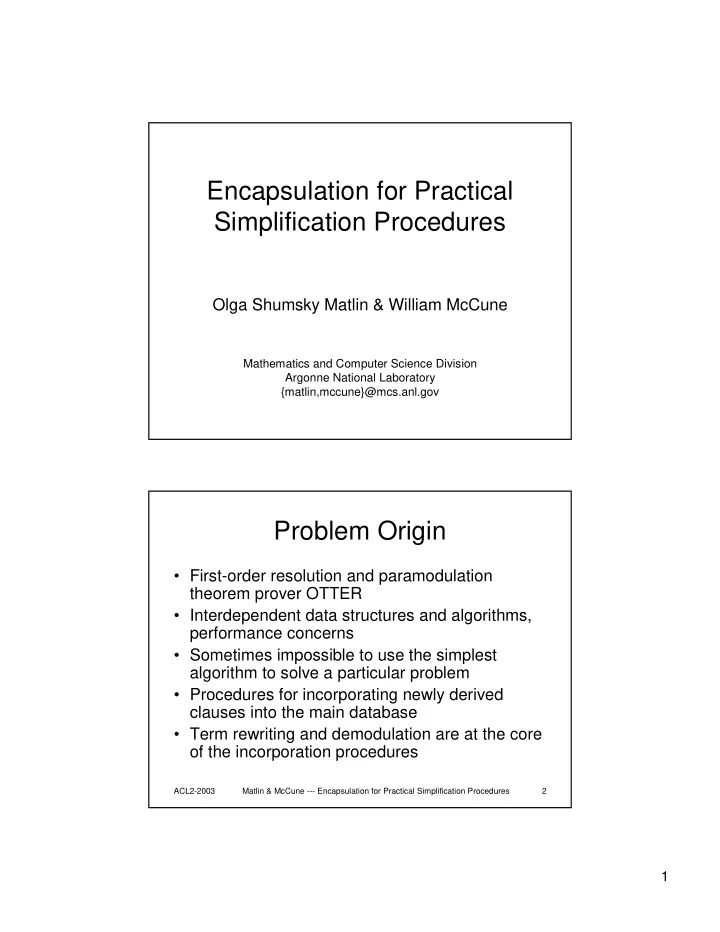

Encapsulation for Practical Simplification Procedures Olga Shumsky Matlin & William McCune Mathematics and Computer Science Division Argonne National Laboratory {matlin,mccune}@mcs.anl.gov Problem Origin • First-order resolution and paramodulation theorem prover OTTER • Interdependent data structures and algorithms, performance concerns • Sometimes impossible to use the simplest algorithm to solve a particular problem • Procedures for incorporating newly derived clauses into the main database • Term rewriting and demodulation are at the core of the incorporation procedures ACL2-2003 Matlin & McCune --- Encapsulation for Practical Simplification Procedures 2 1
Simple Solution: Direct Incorporation � TRUE) if (C 1 ´ Database S D 3 D 1 find D i ∈ S, rewritable by C 1 ´ C 1 ´ D 2 to show termination: enqueue D i ´ = simplify D i by C 1 ´ back subsumption C 1 ´ = simplify C 1 by S and rewriting forward subsumption and rewriting Unincorporated C 1 C 2 C 3 C n Clauses Q ... ACL2-2003 Matlin & McCune --- Encapsulation for Practical Simplification Procedures 3 Limbo Incorporation Database S D 3 D 1 find D i ∈ S, rewritable by C 1 ´ D 2 D i ´ = simplify D i by (S-D i +L) Limbo List L C 1 ´ C 2 ´ C 3 ´ C n ´ D 1 ´ D 2 ´ D 3 ´ ... C i ´ = simplify C i by (S+L) Unincorporated C 1 C 2 C 3 C n ... Clauses Q ACL2-2003 Matlin & McCune --- Encapsulation for Practical Simplification Procedures 4 2
� Verification Goals • Termination of both procedures – in practice, implementation of the simplification function (term rewriting) contains an artificial stopping condition – in practice, termination of the simplification procedure is assumed • Database is irreducible – no element is rewritable by any other element • Procedures produce equivalent databases – order of rewriting is different, does not produce canonical forms – no guarantee that database will contain the same elements – show equivalence with respect to evaluation, sufficient to show that each procedure preserves evaluation of the conjunction of clauses in the original database and queue ACL2-2003 Matlin & McCune --- Encapsulation for Practical Simplification Procedures 5 Key Observations • Simplification is via term rewriting – Rewriting function terminates, rewrites as much as possible, simplifies, is sound, other details unimportant • Details of the evaluation function unimportant • Encapsulate simplification and evaluation functions • Termination of direct incorporation depends on slight modification of the procedure • Measure function based on a special count function: (cons (+ 1 (count q) (count s)) (+ 1 (count q))) • Property for irreducibility proof for limbo incorporation ∀ ∀ ∀ A,B ∈ ∀ ∈ ∈ L, pos(A) < pos(B) ∈ A does not rewrite B ACL2-2003 Matlin & McCune --- Encapsulation for Practical Simplification Procedures 6 3
Solution Statistics • 4 constrained functions – simplify, ceval, scount, true-symbolp • 8 properties of constrained functions • 20 functions to model the procedures and correctness properties, including auxiliary functions • 89 theorems proved, 28 hints required – 2 main irreducibility, 2 main soundness theorems ACL2-2003 Matlin & McCune --- Encapsulation for Practical Simplification Procedures 7 Related Work • IVY project (ACL2 Case Studies) – Verification of the same software – IVY checked soundness of OTTER proofs – Errors in incorporation procedures could lead OTTER to miss some or all proofs – Difficulties in formalization of the evaluation function encouraged the use of encapsulation in this project • J. L. Ruiz Reina, J. A. Alonso, M. J. Hidalgo, and F. J. Martín. Formal proofs about rewriting using ACL2. Annals of Mathematics and Artificial Intelligence , 36(3):239--262, 2002. – Formalization of basic reduction and simplification procedures and their properties – Our project takes both for granted ACL2-2003 Matlin & McCune --- Encapsulation for Practical Simplification Procedures 8 4
Recommend
More recommend